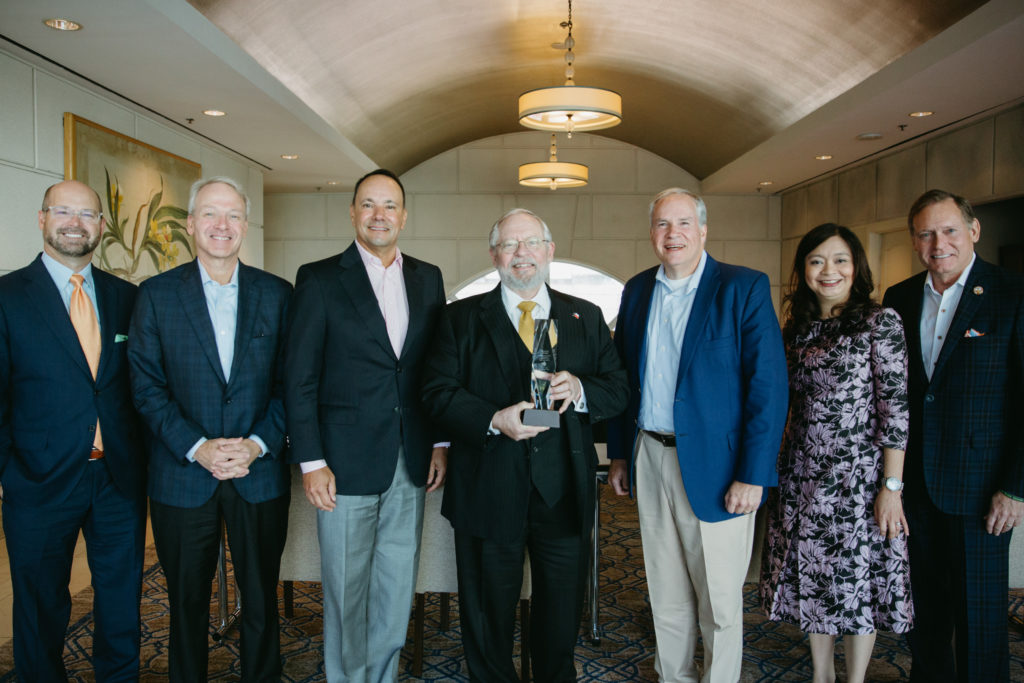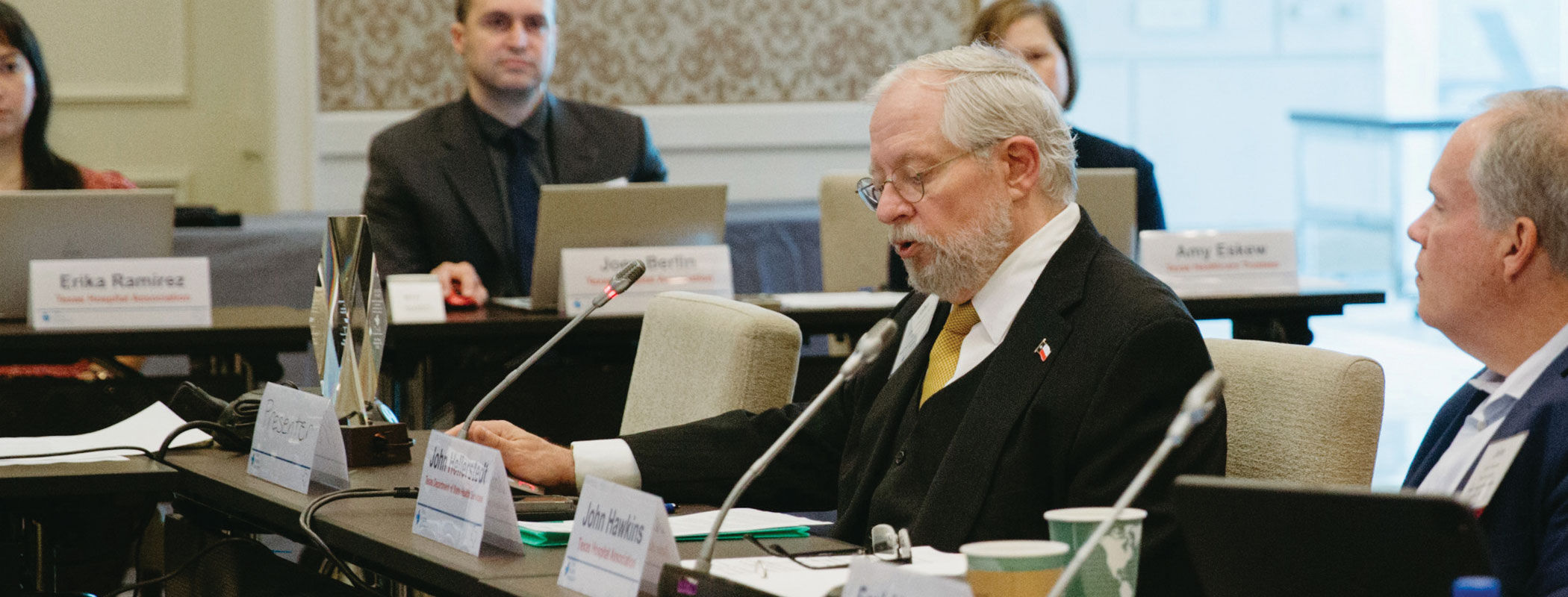Dr. John Hellerstedt has been a respected leader in Texas health care for more than two decades. His public service career began in 2000 when he became medical director of the Bureau of Medicaid Managed Care and CHIP at the Texas Department of State Health Services, then known as the Texas Department of Health.
In 2001, he moved to the Texas Health and Human Services Commission to become medical director for the Medicaid CHIP Division. His other roles include vice president of medical affairs for Dell Children’s Medical Center of Central Texas starting in 2007; associate chief medical office at Seton Family of Hospitals beginning in 2009; and Seton’s chief medical officer starting in 2013.
Dr. Hellerstedt took on the role of commissioner for the DSHS in 2016, overseeing public health operations, policies and plans in Texas. Early on in his tenure at DSHS, Dr. Hellerstedt played an integral role in leading the agency through the Zika virus scare of 2016.
Carrie Kroll, vice president of advocacy, public policy and political strategy for THA, describes Dr. Hellerstedt as a highly intelligent and incredibly hard-working public servant, sharing: “He has set an example of commitment and passion-oriented leadership since his days as a community pediatrician.”

From the pandemic’s onset, Dr. Hellerstedt demonstrated exemplary leadership, overseeing the state staffing program that placed more than 26,000 clinical staff in hospitals, keeping an open ear to hospitals day and night, and following trends of the disease while advocating for both patients’ and hospitals’ needs.
“The pandemic proved that public health and hospitals have to be in lockstep, whether for rolling out vaccines, monitoring capacity or staying equipped with therapeutics. Dr. Hellerstedt brought a steady hand to the fight and helped keep our hospitals and health care systems – and our state – afloat during the worst days of the worst public health crisis in our lifetimes,” said THA President/CEO John Hawkins.
During industry-wide calls to address the pandemic, Dr. Hellerstedt made sure the needs of hospitals were amplified as the state public health team worked to respond. Dr. Hellerstedt also led by example during the pandemic, wearing a mask and becoming one of the first Texans to become vaccinated against COVID-19.
“Always a hard worker, it’s fitting that his retirement comes on the heels of one of the busiest periods of his professional career. Dr. Hellerstedt’s leadership during the COVID-19 pandemic was exhaustive,” said Kroll.
“So many, including myself and hospital leaders throughout the state, are thankful for his astute navigation of the unknown during the pandemic and his evidence-based response,” she added.
For his steadfast and sound public health leadership during COVID-19 and his long and distinguished career in public service prior to the pandemic, THA honored Dr. Hellerstedt with the THA Trustee Award. The award is THA’s highest honor given to someone not directly involved in hospital management. It recognizes significant contributions and outstanding leadership in the health care industry.
Dr. Hellerstedt retired as DSHS commissioner at the end of September. Kroll concluded her appreciation for Dr. Hellerstedt sharing, “We are losing a public health leader with a thoughtfulness that considered each Texan as he directed the department’s response to the pandemic.”

Prior to his retirement, THA sat down with Dr. Hellerstedt to reflect on his time as commissioner for the DSHS and discuss his experience as a leader in health care and public service. Here’s what he had to say:
What led you to pursue a career in health care?
I always had a keen interest in science and many of my teachers encouraged me to pursue medicine. My siblings and I were the first generation in our family to go to college, so higher education was a special source of pride for all of us.
Can you describe your time as commissioner of the Texas Department of State Health Services?
My tenure as commissioner of the Texas Department of State Health Services has been the greatest blessing of my professional life. I am deeply indebted to my team – my executives and every DSHS team member – for making that a reality. Naturally, the challenges of the pandemic stand out in everyone’s mind, but this job has been a privilege and a source of great soul-satisfaction from my earliest days in 2016.
Our team worked together to complete the complex task of “Transformation,” which involved the transfer of several large state programs and thousands of staff to our parent agency, Health and Human Services Commission. Along the way, we also worked with the Texas Legislature through several sessions, coped with the threat posed by the Zika virus, provided medical and public health response to Hurricane Harvey and, since late 2019, faced the daunting, prolonged and often exhausting challenge of the global COVID-19 pandemic. Through all of this, we continued to do the everyday work of running a state agency and leading public health in the state.
What would you say has had the largest impact your career in health care?
I am only now appreciating the impact of my career. I provided clinical care for over 20 years (I count my residency training!). I served as medical director for Texas Medicaid and CHIP, and the Texas Pediatric Society recognized me as Child Advocate of the Year in 2007. I served as a senior physician executive in the Ascension-Seton Family of Hospitals and then as DSHS Commissioner, starting in 2016.
I do not believe in luck or fate, I believe in Providence. Looking back, I have no doubt that Providence guided my career, though I often did not appreciate that as the hour-to-hour challenges of professional life presented themselves.
Each of those experiences tempered me, allowing me and sometimes coercing me to mature and grow. If I have demonstrated success as a leader, public health official and advisor to elected leaders, I know that success was only the result of the many lessons I had learned along the way.
What has been the biggest challenge you’ve faced while working in health care?
Clinical pediatric practice was the greatest challenge. There were long hours of service. There was great joy in seeing your patients grow and develop. There were, on rare occasions, tragic losses. By virtue of that experience, I will always hold my clinician colleagues in the highest esteem.
What does a career in public service mean to you?
Really, the name says it all: servant of the public and servant of the common good. To me, public service means dedication to a mission.
What characteristics have you found to be important for leaders in health care to embody?
Leaders in health care, like leaders everywhere, must conduct themselves moment to moment in the sure knowledge that they are nothing without their team. The leader must instill an ethic where the members of the team, the members of every team in the organization, lift each other up. This is especially true in health care.
Only fellow team members know the skill and hard work that it takes to provide safe and effective care in a complex environment such as a modern hospital.
Patients and families may express admiration and gratitude to their caregivers, but only fellow team members know just how challenging the mission is. Therefore, it is essential that we see and publicly celebrate the talent and virtue we see being demonstrated all around us. We must not keep that admiration to ourselves, for when we express that admiration doing so lights up the entire workplace. It affirms the value and dignity of our teammates and gives us the resilience to persist in the face of even the most daunting challenges.
What is the biggest piece of advice you would share with other leaders in health care?
Lead by example: lift each other up.

